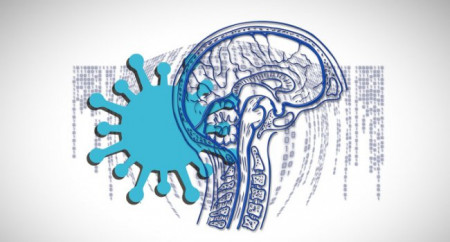Scientists figure out mechanism of brain damage by COVID-19

Scientists in the UK and Switzerland have found out how the coronavirus affects the human brain.
The infection does not cause neuronal death, but provokes inflammatory reactions that can explain neurological symptoms, a study published in the bioRxiv preprint repository noted.
The scientists studied the spread and effect of the COVID-19 in the central nervous system (CNS) of K18-hACE2 transgenic mice that expressed the human ACE2 enzyme, a protein that allows coronavirus to enter the cell. One group of rodents was infected with low doses of coronavirus, and another was first infected with the influenza A virus, and then 3 days later with the coronavirus. The third group of animals was used for control. Mice were euthanized 3-7 days after the dose of SARS-CoV-2.
Scientists found that the COVID-19 entered the central nervous system and spread through neurons on the seventh day of infection. First, it affected the olfactory bulb and then penetrated the lower regions of the brain and spinal cord. The virus did not cause nerve cell death, axonal damage or demyelination, but there was an increased activity of the immune cells of the nervous system - macrophages and T cells, which caused moderate inflammation. All this was accompanied by the death of microglial and endothelial cells during apoptosis.
Microgliosis and apoptosis of immune cells indicate that it is microglial cells that may play an important role in the mechanism of development of neurological disorders during prolonged COVID-19.
Scientists have long found that the SARS-CoV-2 coronavirus affects not only the respiratory system but also affects the brain, causing neurological symptoms such as loss of smell and taste, headache, fatigue or more serious complications, such as cerebrovascular disease.
 The Power of One Dram to the Road of Life Charitable Organization
The Power of One Dram to the Road of Life Charitable Organization
 AMIO bank issues bonds
AMIO bank issues bonds
 General Director of Ucom gave a lecture at the French University in Armenia
General Director of Ucom gave a lecture at the French University in Armenia
 Amio Bank participated in Career City Fest 2K24
Amio Bank participated in Career City Fest 2K24
 Transfers to Visa cards of foreign banks are available in the Unibank mobile app
Transfers to Visa cards of foreign banks are available in the Unibank mobile app
 ZCMC CJSC general director R.N. Khudoli on the օccation of Internatioanal Labour day
ZCMC CJSC general director R.N. Khudoli on the օccation of Internatioanal Labour day
 Gagik Khachatryan's prolonged denial of medical care amounts to torture. attorney
Gagik Khachatryan's prolonged denial of medical care amounts to torture. attorney
 More and more smiles in the city. 'Kentron' branch of AMIO BANK was reopened
More and more smiles in the city. 'Kentron' branch of AMIO BANK was reopened
 Idram and IDBank at Career City Fest
Idram and IDBank at Career City Fest
 Idram and IDBank as participants of Career City Fest
Idram and IDBank as participants of Career City Fest
 Ucom provides four bus stops in Ijevan with free Wi-Fi
Ucom provides four bus stops in Ijevan with free Wi-Fi
 An exhibition dedicated to Charles Aznavour's centennial anniversary Yerevan, May 22 – July 22
An exhibition dedicated to Charles Aznavour's centennial anniversary Yerevan, May 22 – July 22
 Caring for nature, we have started with ourselves - Team Telecom Armenia
Caring for nature, we have started with ourselves - Team Telecom Armenia
 Up to 10% cashback from GetTransfer with IDBank cards
Up to 10% cashback from GetTransfer with IDBank cards
 Amio Visa Signature Business card. When the opportunities are unlimited
Amio Visa Signature Business card. When the opportunities are unlimited
 Up to 1% cashback when shopping on Wildberries with IDBank cards
Up to 1% cashback when shopping on Wildberries with IDBank cards
 Ucom continues network modernization in regions of Armenia
Ucom continues network modernization in regions of Armenia
 Co-founders of Galaxy Group of Companies Co-Hosts Business Breakfast to Strengthen Armenian-French Business Ties
Co-founders of Galaxy Group of Companies Co-Hosts Business Breakfast to Strengthen Armenian-French Business Ties
 Leasing agreement and a number of advantages. Amio is in the Leasing Expo with a special offer
Leasing agreement and a number of advantages. Amio is in the Leasing Expo with a special offer
 International transfers from card to card with IDBank VISA cards
International transfers from card to card with IDBank VISA cards
 Which Book to Choose as a Gift for the Book Giving Day? A Piece of Advice from Idram and IDBank
Which Book to Choose as a Gift for the Book Giving Day? A Piece of Advice from Idram and IDBank
 The Christmas gift from the Galaxy Group of Companies is the restoration of a song extricated by
Khrimian Hayrik
The Christmas gift from the Galaxy Group of Companies is the restoration of a song extricated by
Khrimian Hayrik
 Galaxy Group of Companies replaced the traditional New Year's gifts with houses of kindness and peace crafted by the chi...
Galaxy Group of Companies replaced the traditional New Year's gifts with houses of kindness and peace crafted by the chi...
 Ucom օffers combining mobile and fixed services in Unity packages and save up to 45%
Ucom օffers combining mobile and fixed services in Unity packages and save up to 45%
 I personally promised the greatest athlete that he will definitely witness the eternity of his own fame. Gagik Tsarukyan...
I personally promised the greatest athlete that he will definitely witness the eternity of his own fame. Gagik Tsarukyan...
 Donate blood, help to live
Donate blood, help to live
 The Blessing and the handover of the Crosses of Ashot II the Iron under the sponsorship of Tovmasyan Foundation
The Blessing and the handover of the Crosses of Ashot II the Iron under the sponsorship of Tovmasyan Foundation




